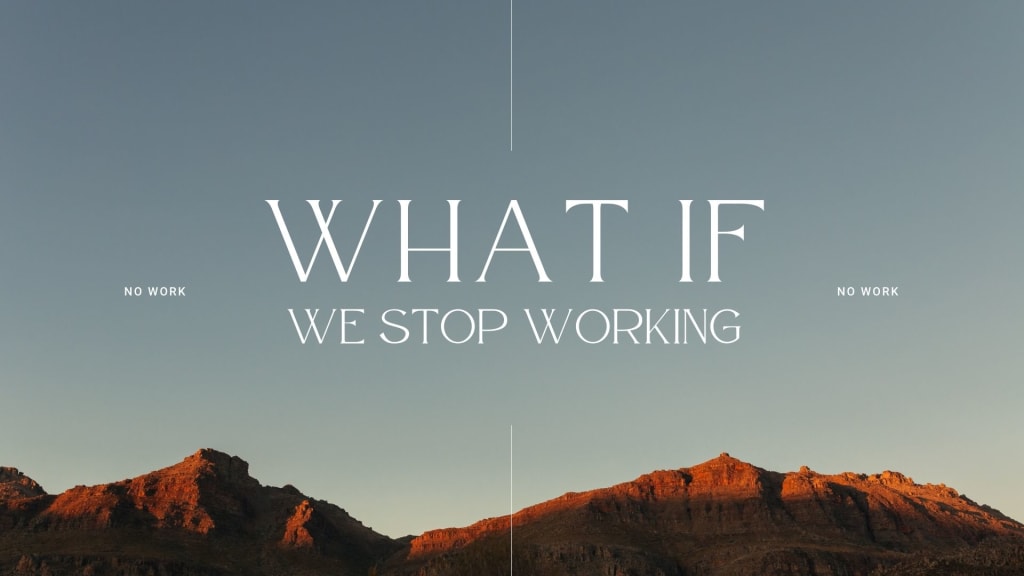What If We Stop Working...!!!!
Ever think about how the average person is orders of magnitude more productive than workers of the past, and yet our work week hasn't gotten any shorter? What's the deal? In this week's episode we're looking at the idea of "work," and how it's been so thoroughly polluted by capitalism.

"What If We Just Stopped Working?"
The contemplation of a world devoid of work serves as a catalyst for profound reflection on the nature of labor and its role in society. In this exploration, we delve into the intricate web of implications woven into the fabric of our existence by the concept of work, pondering the ramifications of its absence and the potential for transformative change it holds.
At the heart of this inquiry lies an examination of the pervasive influence exerted by work upon every facet of human existence. From the means by which we sustain ourselves to the frameworks through which we derive meaning and identity, work stands as an omnipresent force shaping the contours of our collective reality. Yet, despite its ubiquity, the question arises: What if we were to collectively cease our laborious pursuits?
In grappling with this query, we confront a multitude of interwoven threads, each offering insights into the intricate tapestry of human society. The prospect of a world devoid of work conjures visions of both liberation and chaos, prompting us to consider the fundamental underpinnings of our socio-economic systems and the inherent value assigned to labor.
Drawing upon empirical evidence from experimental endeavors such as the implementation of a four-day work week in nations like Iceland, we glean glimpses of the transformative potential harbored within alternative paradigms of work. These initiatives, characterized by a reevaluation of traditional notions of productivity and well-being, offer a tantalizing glimpse into a future where the rhythms of life are attuned to the cadence of human flourishing rather than the relentless march of economic imperatives.
Yet, amidst these glimmers of possibility, we confront the stark realities of contemporary labor dynamics, wherein vast swathes of the population find themselves ensnared within the grip of meaningless toil. The erosion of meaning and purpose within the realm of work underscores a profound disconnect between the aspirations of individuals and the exigencies of economic exigencies, laying bare the inherent contradictions embedded within our current socio-economic framework.
Navigating these turbulent waters necessitates a reexamination of deeply entrenched ideological constructs, wherein the valorization of ceaseless toil is interrogated in favor of a more nuanced understanding of human fulfillment and flourishing. The confluence of political inertia and cultural narratives perpetuating the myth of "rise and grind" serves as a formidable barrier to meaningful change, necessitating a concerted effort to challenge the status quo and envision alternative futures predicated upon principles of equity and justice.
In this endeavor, the imperative of democratizing decision-making processes surrounding work allocation emerges as a central tenet, offering a pathway towards the realization of a more just and equitable society. By prioritizing the well-being of individuals over the imperatives of profit maximization, we lay the groundwork for a future wherein work serves as a vehicle for human flourishing rather than a yoke of oppression.
In conclusion, the question of what would happen if we were to cease working serves as a potent catalyst for reimagining the contours of human society. Through a nuanced exploration of the myriad implications inherent within this inquiry, we unearth the transformative potential harbored within alternative paradigms of work, beckoning us towards a future wherein the rhythms of life are attuned to the symphony of human flourishing.
Summary
The contemplation of a world without work prompts deep reflection on the role of labor in society. Initiatives like Iceland's four-day work week offer insights into a potential future where well-being and productivity coalesce. However, many endure meaningless jobs, highlighting the need for reevaluation. Political inertia and cultural narratives perpetuate long hours despite widespread dissatisfaction. Democratizing work allocation emerges as a crucial step toward a more equitable society. By prioritizing human flourishing over profit, we can redefine the purpose of work. Ultimately, the question of a world without work serves as a catalyst for envisioning alternative paradigms where labor enhances rather than diminishes human life.






Comments
There are no comments for this story
Be the first to respond and start the conversation.